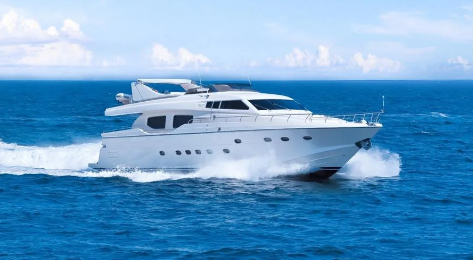- This topic is empty.
-
AuthorPosts
-
17/02/2025 at 14:05 #81816
With the continuous advancement of navigation technology, marine air conditioning has become one of the indispensable equipment in modern ships. Whether it is a commercial ship, yacht, or fishing boat, marine air conditioning can provide a comfortable cabin environment for crew and passengers. However, there are many types of marine air conditioners, and different types of marine air conditioners are suitable for different ships and usage scenarios. This article will introduce the types and characteristics of marine air conditioners in detail to help you better understand how to choose a suitable air conditioning system for your ship.
1. Basic concepts and functions of marine air conditioners
Marine air conditioning is an air conditioning system specially designed for ships. Its main function is to adjust the temperature, humidity, and air quality in the cabin to ensure that crew and passengers can enjoy a comfortable environment during the voyage. Unlike household air conditioners, marine air conditioners need to adapt to special environmental conditions at sea, such as high humidity, salt spray corrosion, vibration, and tilt.
2. Main types of marine air conditioners
Marine air conditioners can be divided into many types according to different classification standards. The following are common classification methods and their characteristics:
Classification by refrigeration method
Compression marine air conditioner: Compression marine air conditioner is the most widely used type at present. Its working principle is similar to that of household air conditioners. The refrigeration cycle is realized through components such as compressors, condensers, evaporators, and expansion valves. This type of air conditioner has high refrigeration efficiency and is suitable for ships of all sizes.
Absorption marine air conditioner: Absorption marine air conditioner uses thermal energy (such as engine waste heat) as a power source and achieves refrigeration through the circulation of absorbent and refrigerant. This air conditioner is suitable for large ships, especially those with sufficient waste heat resources.
Classification by installation method
Split marine air conditioner: Split marine air conditioner consists of an indoor unit and an outdoor unit. The indoor unit is installed in the cabin, and the outdoor unit is installed on the deck or engine room. This air conditioner is flexible to install and suitable for ships with limited space.
Integrated marine air conditioner: Integrated marine air conditioner integrates components such as compressor, condenser, and evaporator in one chassis, which is usually installed outside the cabin. This air conditioner has a compact structure and is suitable for small ships.

Classification by function
Cooling-only marine air conditioner: Cooling-only marine air conditioner only has a cooling function and is suitable for ships sailing in hot areas.
Heating and cooling marine air conditioner: Heating and cooling marine air conditioner can both cool and heat, and is suitable for ships sailing in areas with large temperature differences between the four seasons.
Classification by power type
AC power marine air conditioner: AC power marine air conditioner uses the ship's AC power system and is suitable for most commercial and civilian ships.
DC power marine air conditioner: DC power marine air conditioner uses the ship's DC power system and is suitable for small yachts or sailboats.
Classification by usage scenario
Yacht air conditioner: Yacht air conditioners focus on aesthetics and quiet design, usually with a split or integrated structure, which is suitable for small yachts.
Commercial ship air conditioner: Commercial ship air conditioners need to have high reliability and durability, usually using compression or absorption refrigeration.
Fishing boat air conditioner: Fishing boat air conditioner needs to adapt to the harsh marine environment, usually with anti-corrosion and anti-vibration functions.
3. How to choose a suitable marine air conditioner?
The following factors need to be considered when choosing a suitable marine air conditioner:
Ship type: Different types of ships have different requirements for air conditioning. For example, yachts focus on beauty and quietness, while fishing boats focus on durability.
Cabin area: The larger the cabin area, the higher the required air conditioning power.
Use environment: Ships sailing in hot areas require stronger cooling capacity, while ships sailing in cold areas require heating functions.
Budget: The prices of marine air conditioners vary greatly, and you need to choose the right brand and model according to your budget.
4. Maintenance and care of marine air conditioners
In order to extend the service life of marine air conditioners, regular maintenance and care are essential. Here are some common maintenance suggestions:
Clean the filter regularly: Dust accumulation on the filter will affect the cooling effect and air quality of the air conditioner.
Check the refrigerant: Insufficient refrigerant will cause the cooling effect of the air conditioner to decrease.
Anti-corrosion treatment: Check the air conditioner casing and pipes regularly to prevent salt spray corrosion.
Professional maintenance: Perform professional maintenance at least once a year to ensure the normal operation of the air conditioning system.
Marine air conditioning is an important guarantee for the comfort and safety of ships. By understanding the types of marine air conditioners and their characteristics, you can choose the right air conditioning system according to your needs. Whether it is a yacht, fishing boat or commercial vessel, marine air conditioning can provide a comfortable environment for your sea journey. I hope this article can provide you with valuable information and help you better understand the world of marine air conditioning.
http://www.kmevehicleac.com
kmevehicleac -
AuthorPosts
- You must be logged in to reply to this topic.


